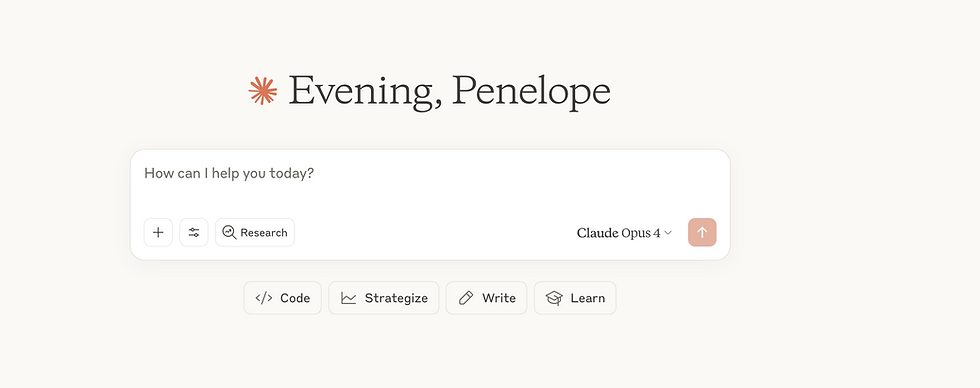Word of the Year 2025: A Simple Yet Powerful Tool for Personal Development
- Penelope Silver
- Jan 5, 2025
- 3 min read

Introduction:
For years, I’ve chosen a Word of the Year instead of making traditional New Year’s resolutions.
As someone who is neurodivergent (ADHD with mild autism and Asperger's), I’ve always struggled to stick to resolutions or form consistent habits.
But focusing on one word throughout the year has been life-changing.
When I see my word pop up on my screensaver or a sticky note, it pulls me back into focus. It’s a gentle nudge reminding me of my priorities, and it works.
But there’s one rule: you can only choose ONE word for the year.
In this blog, I’ll share:
Why a Word of the Year works better than resolutions
How to choose your word
How AI (like my Word of the Year GPT) can help
Why a Word of the Year Works Better Than Resolutions
Every January, millions of people set New Year’s resolutions—and by February, many have already given up.
The problem? Resolutions are often rigid, overwhelming, and focused on outcomes rather than direction.
A Word of the Year works differently:
It’s flexible: It adapts to different areas of your life.
It’s simple: One word is easier to remember and focus on.
It’s sustainable: You can revisit your word daily, without feeling pressured.
For neurodivergent individuals, this approach removes the overwhelm of rigid goals and offers a simple, effective focus tool.
Takeaway: One word can guide your choices, actions, and mindset throughout the year.
The Psychology Behind a Focus Word
Why does a single word work so well?
Visual Cues Reinforce Focus: Seeing your word daily (on a screensaver, notebook, or sticky note) creates a subconscious reminder.
Decision-Making Simplified: When faced with a choice, you can ask, "Does this align with my word?"
Positive Reinforcement: Your word acts as a compass, not a rulebook.
Example: If your word is "Abundance," you might:
Choose opportunities that bring growth.
Practice gratitude daily.
Say yes to things that align with your bigger vision.
T
akeaway: A focus word becomes your North Star, guiding your everyday decisions.
How to Choose Your Word for 2025
Choosing your word is a deeply personal process.
Here’s a simple guide:
Reflect on Last Year: What worked? What didn’t?
Identify Your Priorities: What do you want more of in 2025?
Choose Words That Resonate: Some popular examples include:
Growth
Balance
Courage
Abundance
Test It Out: Say your word aloud. Does it feel right?
Don’t overthink it—trust your gut.
Takeaway: The right word will feel like it fits your season of life.
The Power of Seeing Your Word Daily
Visibility is key.
Here are simple ways to keep your word front and centre:
Screensavers: Set your word as your phone or computer wallpaper.
Sticky Notes: Place them on mirrors, desks, or your fridge.
Journaling: Start each week by reflecting on your word.
When you see your word daily, it becomes part of your mindset.
Takeaway: The more you see your word, the more it shapes your thoughts and actions.
Your Word of the Year 2025 Generator
To make this even easier, I’ve built a Word of the Year Generator GPT.
This AI tool will guide you through the process of choosing your word based on your goals and intentions.
Important: To access and use this GPT, you’ll need a paid ChatGPT account (ChatGPT Plus or higher).
Give it a try and let it spark some inspiration for your 2025 focus word!
Takeaway: AI can make the process fun, reflective, and insightful.
How to Stay Connected to Your Word All Year Long
Monthly Check-Ins: Reflect on your word’s impact.
Celebrate Wins: Acknowledge small milestones.
Stay Flexible: Your word is a guide, not a rulebook.
Takeaway: Consistency beats perfection.
Start Your 2025 with Purpose
Choosing a Word of the Year isn’t just a trend—it’s a life-changing focus tool.
Try the Word of the Year GPT.
Build your own custom GPT.
Keep your word visible and intentional.
If you’re ready to explore this approach or need help building your own GPT, get in touch.
L
et 2025 be the year you focus, simplify, and grow—one word at a time.
CTA: Discover your Word of the Year with our Generator and set the tone for a transformative 2025.
.png)



If you're on a journey of self-discovery and suspect you might be neurodivergent, finding accessible resources is key. A simple tool to explore neurodiversity online can be a good first step. These tests generally ask about a range of experiences related to how you think, process information, interact with others, and manage daily tasks. The aim is to help you identify potential neurodivergent traits by reflecting on these questions. It's important to remember that this is a self-screening tool, not a diagnostic one. However, it can empower you with more self-knowledge and help you decide if you wish to pursue formal evaluations for conditions like ASD or ADHD with qualified professionals.
If you're looking to explore neurodiversity traits in yourself, perhaps because you've always felt a bit different or resonated with descriptions of conditions like autism, ADHD, or high sensitivity, a broad online screener can be informative. These tests are designed to help you reflect on a variety of cognitive and behavioral patterns. For example, a neurodivergent test might ask about your communication style, how you handle sensory input, or your organizational skills. The goal isn't to get a diagnosis from the test itself, but to gain self-awareness and see if your experiences align with common neurodivergent characteristics. This can then guide further research or consultation with specialists.